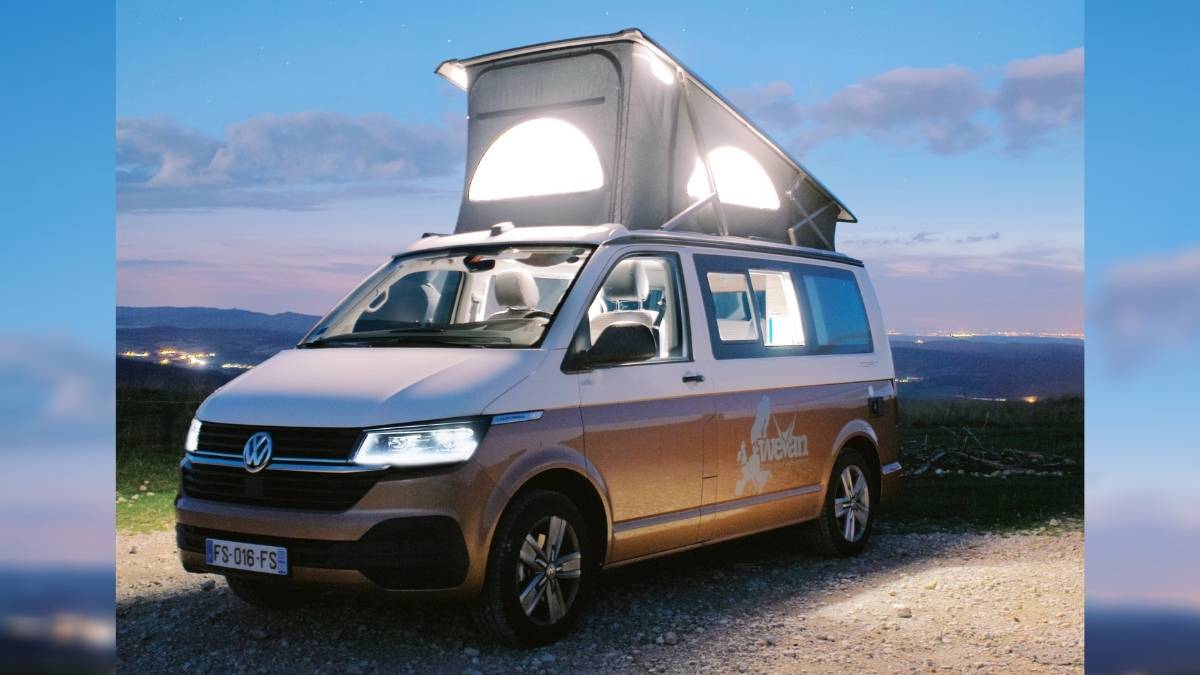There is nothing better than enjoying the outdoors in a campervan. Hiring one is a great way to get out and appreciate landscapes, activities, and people in the UK and further afield.
I remember the first time we hired a campervan. It was in Perth, Western Australia.
The van was a long wheel-base Mercedes Sprinter van conversion. Containing an internal toilet and shower, it was more of a motorhome than a traditional camper.
There was an abundance of similarly-equipped vans for rent there, and they were designed to suit the terrain in that part of the world. The more adventurous could choose the off-road 4 wheel drive versions, but we were comfy campers, happy to stick to the sealed roads.
From that first trip, we were hooked. We loved the freedom of the open road – turning up at some random site for the night in the middle of nowhere, just adventuring.
Over time we have become campervan owners ourselves. We can’t stress enough though the importance of hiring a campervan first before rushing off to purchase one. We have hired many vehicles over the years to really double down on what vehicle suits our family needs best.
It’s easy to become seduced by pictures online of beautiful landscapes and the ability to tour where you like, but first, try before you buy. You might just surprise yourself with what you discover are must-haves and no-ways.
- Campervan hire – needs and options
- What’s the difference between a campervan and a motorhome?
- How to hire a campervan or motorhome
- Campervan Hire Costs in the UK
- What do you need to hire a campervan?
- Hiring a campervan through a campervan hire company
- Hiring from a private campervan website
- Campervan and Motorhome Insurance
- Are you licensed to drive a campervan?
- Should you hire a SWB or LWB campervan?
- What additional equipment do you need for your campervan hire?
- Do you need to take an awning/tent?
Campervan hire – needs and options
The first step in hiring a campervan is identifying what your requirements are.
Answer these questions to help you decide what vehicle to hire.
- Budget and timescale: Flexibility on either or both will give you more choices.
- Seatbelted seats: How many people need to travel in the vehicle with you? Most vehicles will offer 5 seatbelted positions but there are vehicles like the VW California Ocean that only have 4 seatbelted positions.
- Berths: How many people will be sleeping in the vehicle? Campervans typically berth two to four people but larger motorhomes can accommodate anything from four to eight.
- Kitchen: Do you need to have cooking facilities and a fridge on board? Most campervans offer this built-in but specialist vehicles such as the VW California Beach or a Landrover with an ikamper do not.
- Bathroom: Do you need a shower and toilet available or will you be camping at a site with an amenities block?
- Parking: Will you need to park at supermarkets or town centres? Bear in mind the limitations of parking a longer and wider vehicle.
- Equipment: Many hire vehicles with a kitchen come with basic food prep and dining equipment, but you may have to hire or take bedding, an awning, and any other camping equipment.
- Off-road: Do you plan to do any wild camping or drive on remote beaches? A 4WD camper may be what you need.
- The UK or Europe: Taking a vehicle across the Channel or the Irish Sea may incur extra hire and insurance costs.
What’s the difference between a campervan and a motorhome?
There is a certain amount of overlap between campervans and motorhomes, but it is useful as a hirer to understand the basic differences.
In brief, a campervan is typically a 4/5-seater, 2/4-berth vehicle which has been built from a commercial van body. Campervans can have a short- or long-wheelbase and can come in different heights too. A short-wheelbase van is about the same length as a standard estate car.
Campervans often have a pop-up roof bed, and there is no divide between the cab and the living quarters.
A motorhome is usually a wider and longer vehicle than a campervan, and is built on a bus or truck chassis.
Motorhomes are designed to be completely self-contained with all facilities on board including a kitchen, shower, and toilet. There is usually a clear separation between the driving cab and living quarters.
How to hire a campervan or motorhome
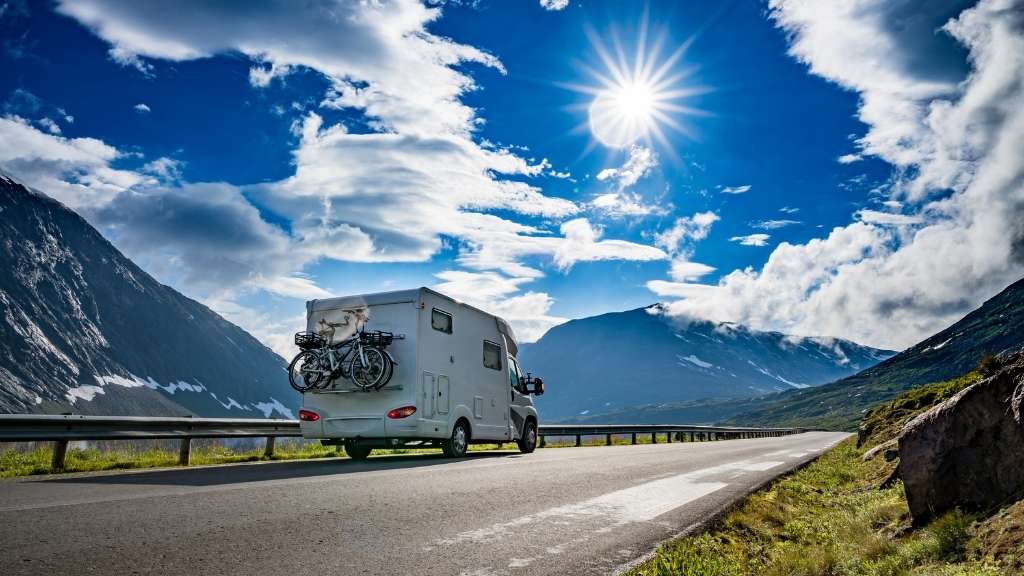
There are a couple of ways you can hire a campervan. You can either hire from a campervan or motorhome hire company with their own fleet, or from a private owner.
The best way to hire privately is by using a peer-to-peer private campervan hire website.
We have done both and so can offer insights on the pros and cons of each.
Campervan hire companies
This would be the usual starting point for someone looking to hire a campervan or motorhome. A quick Google search will help find companies local to where you live or where you want to hire from.
Pros
- High-quality modern vehicle.
- Well maintained.
- Help on hand if required on the road.
- Replacement vehicle supplied should it be necessary.
- Choice of campervans available.
Cons
- More expensive per night than private campervan hire.
- Stricter rules for collection and drop off.
- High liability threshold unless excess insurance taken out.
- Often have minimum hire periods.
- Less gear supplied with the vehicle.
Peer-to-peer private hire websites
These are a new breed of websites which allow a campervan or motorhome owner to list their vehicle for hire. The platforms act in much the same way as Airbnb does for holiday properties.
Pros
- Often cheaper daily hire fee than a traditional hire company.
- More camping equipment supplied with the hire.
- Often more accessories available to hire additionally.
- Often more flexible with minimum hire periods.
- Wide range of unique campervans to appeal to all tastes.
Cons
- No back-up vehicle should yours break down or you encounter problems.
- You may be reliant on your own breakdown company should you need help.
- A big responsibility in using someone’s personal property.
Campervan Hire Costs in the UK
Typical costs you can expect to pay when hiring a campervan are:
- Per night fee – there is often a two or three-night minimum.
- Additional driver fee.
- Damage deposit – refundable when the van is returned in good condition.
- European travel surcharge.
- Motorhome hire excess insurance (optional).
- Additional equipment hire.
- Pet surcharge.
Sample costs for hiring a VW campervan
Here are some sample costs as a guide as to what it will cost to hire a similar VW campervan from a hire company and privately.
The prices shown are a guide only, and will vary according to the campervan model, additional requirements, and time of year.
| Cost | Campervan Hire Company | Private Campervan Rental |
|---|---|---|
| Per-night hire | £120 | £100 |
| Non-refundable booking deposit | 50% of total booking | 50% of total booking |
| European surcharge | £184 | European travel often included |
| Additional Driver (one off fee) | £66 | Usually included |
| Pet surcharge (one off fee) | £50 | Included at owner’s discretion |
| Excess | £1,000 | £1,000 |
What do you need to hire a campervan?
Typical requirements for hiring a campervan are:
- A UK driving license, held for a minimum of 2 years. You’ll likely be asked to share your license information from the DVLA.
- Another form of ID which proves your address.
- Aged from 25-70 years of age.
- A credit/debit card to pay the booking deposit to reserve the vehicle (often 30-50% of total booking cost).
- A credit/debit card to secure the refundable damage deposit – an imprint of typically £750-£1,000.
Hiring a campervan through a campervan hire company
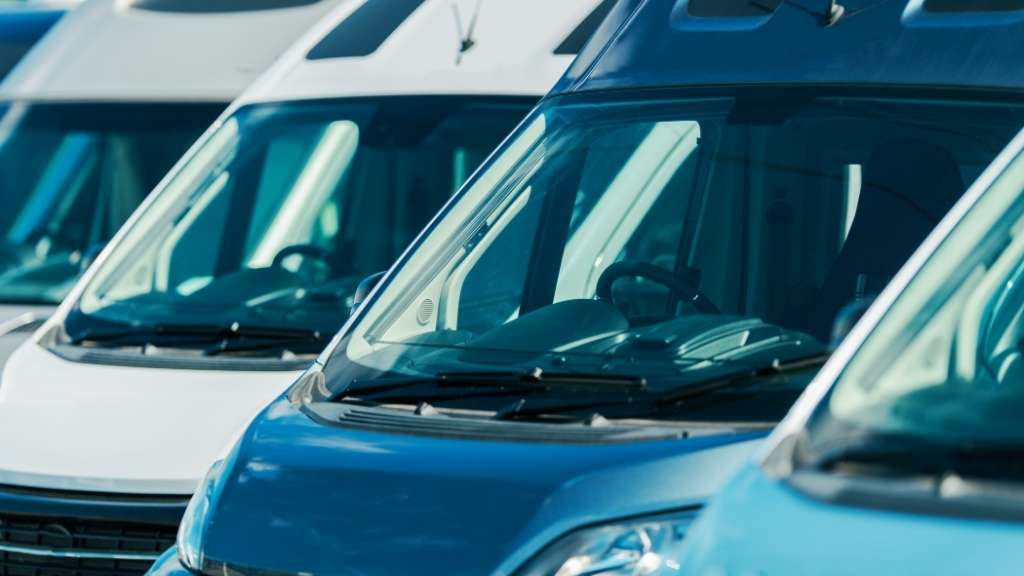
Luckily for us, there are a few reputable campervan hire companies locally to where we live. We made an appointment with a well-known one, to have a look at their fleet.
Having hired vans before, we knew what sort of vehicle we were looking for. Their campervans were only a couple of years old at most. All were beautifully clean and maintained. We made our selection and got our booking confirmed.
Hire period considerations
When hiring a campervan, one practical consideration is deciding exactly how long you are going to need it for. This isn’t just how long your trip away is going to be. You also need to factor in getting your van packed and unpacked again.
Packing and unpacking
With our first UK campervan hire, we filled our family car to the brim and drove the 20 minutes to the hire location. From there it took a good hour to get everything in, kids and all and get away.
The hire company we used offered secured parking for our family car so we could leave it at their premises for the duration of our holiday which meant we could pack and unpack the van on site.
It did mean we were limited to what we could bring with us to what we could ram into our family car. It would have been preferable to have driven the campervan back to our home and packed it there.
That would have meant the hire period would need to be longer though at both ends of the trip to achieve this. The cost overall would be an extra day as we would have wanted to pack the van and get away early in the morning.
Cleaning
Also, make sure you understand whether you are to clean the campervan on return as well, as this will take extra time.
Office hours
Most hires commence and end during office hours which limits how many miles can you get in on your first and last day of travel. This isn’t important to everyone but to us, with two small children, it did.
Hiring from a private campervan website
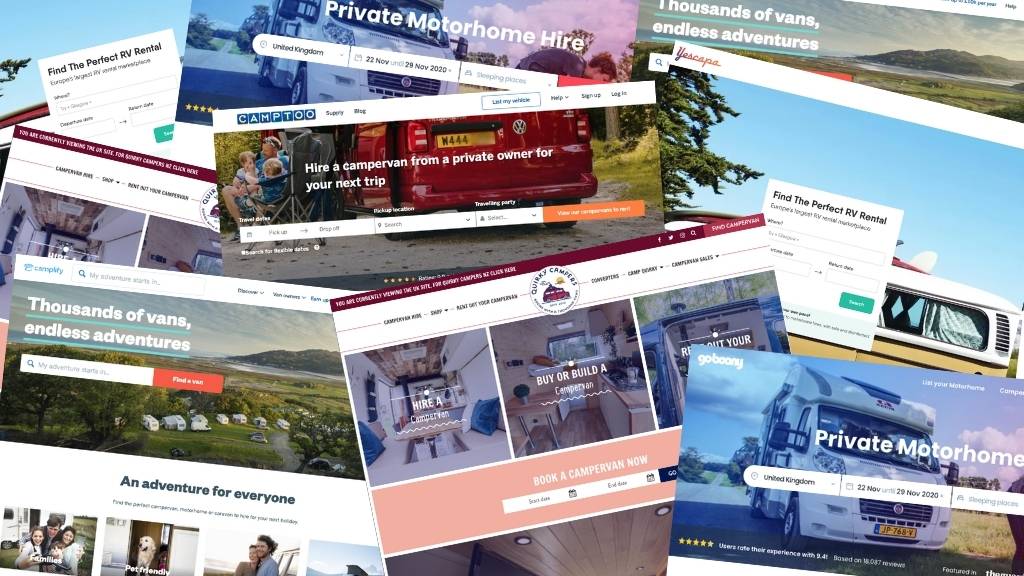
We found a private van owner close to our home on a private hire rental company website.
They had a VW conversion, very similar in spec to what we had been thinking about buying for ourselves. A perfect try-before-you-buy scenario. Better still it was available for a 10-day hire over the school holidays.
The hirer was very flexible about allowing us to view the van in advance, he offered to deliver it to our house for us and offered us extra equipment we could hire in addition to the inventory that came with the van.
We weren’t charged for the extra time we had the van to allow us to comprehensively pack and be ready for our grand tour.
As there wasn’t a rental booked directly after ours, he was also generous on the return time which was helpful as we needed time to unpack and clean the van before returning it.
The key benefits we experienced were; a more reasonable cost per night for the hire than through the campervan hire company, an opportunity to hire equipment we didn’t own ourselves, to improve the experience and greater flexibility with timings.
It definitely helped us with the decision on what campervan we should ultimately buy.
Read more: Private Campervan Hire (How to Hire Someone Else’s Campervan)
Campervan and Motorhome Insurance
You might be wondering how the insurance works when hiring a campervan or motorhome.
Hire companies cover the first-named driver with a fully comprehensive insurance policy for the duration of the hire. This is included in the per-night hire cost.
If you add an additional driver to the hire agreement, then this is extended to them too but costs and additional fee.
The security deposit you pay on hiring a campervan or motorhome is usually anything from £500-£1000. The hire company will take an imprint of your credit card to ensure against loss or damage.
Extent of cover
You need to be aware though that the insurance often only covers damage to the hire vehicle and third parties, but not your property or passengers. Make sure you read the small print when you receive the rental agreement.
Just in case, it is worth having your own travel insurance to ensure medical and personal belonging costs are covered.
You are liable for any damage which occurs to the campervan whilst you are hiring it. This is true if someone backs into you in a car park or opens their car door into the side of the vehicle and leaves a dent. Not your fault but the liability falls with you as the hirer of the vehicle.
One way to protect yourself is to take out motorhome hire excess insurance which reduces your liability down to as little as £150 should the worst happen.
Always double-check the clauses and make sure you are aware of what is covered and what exclusions apply.
Private campervan hire insurance
If you hire a campervan or motorhome through a private hire website, you can rest assured insurance is part of the arrangement.
Depending on which platform and even which campervan or motorhome you hire will depend on the individual insurance conditions. There is always insurance available or included so you can hire away, worry-free.
Read more: Excess Insurance for Campervan Hire (a Guide for Hirers)
Are you licensed to drive a campervan?

An ordinary UK drivers license permits the holder to drive a vehicle up to 3,500kg Maximum Authorised Mass with up to 8 passenger seats and driver. You can tow a trailer of up to 750kg in addition to this.
Many campervans and motorhomes are “plated down” to 3,500kg to allow for the vehicle to be driven with an ordinary car driving licence.
Should you hire a SWB or LWB campervan?
The first time we hired a campervan in the UK we hired a converted VW transporter from a local hire company. We opted for a long-wheelbase vehicle as that mirrored what we had hired previously and felt that, as a family of four, we would need the extra space.
It was a bonus to have the extra internal space (around 30cm more than a SWB van) but we had to weigh up whether the extra space on the inside was worth the limitations of being in a long-wheelbase vehicle.
The first thing we found was parking in any car park was a potential problem. Most spaces allow for 5m vehicle length only.
A VW Transporter SWB base van is 4,892cm and a VW Transporter LWB 5,292cm
Standard parking bays in the UK are 2.8m wide by 4.8m long.
This is true whether you find yourself in a supermarket car park, a multi-storey car park, or a town-centre council car park.
The only place we found we might get lucky was parked on the street but the chances of finding a parking space big enough to fit a long wheel base in high season in a tourist town are slim.
Whether you hire a motorhome, long-wheelbase or short-wheelbase campervan comes down to your own needs; how many passengers, berths, facilities on board and parking limitations.
I’m pleased we hired that long-wheelbase vehicle as our first campervan hire in the UK.
The UK isn’t the same as Australia in terms of roads, parking spaces, or campsites and so it highlighted to us the limitations of driving and parking a larger vehicle and how that was something that in the end was not negotiable. Short-wheelbase all the way for us.
What additional equipment do you need for your campervan hire?
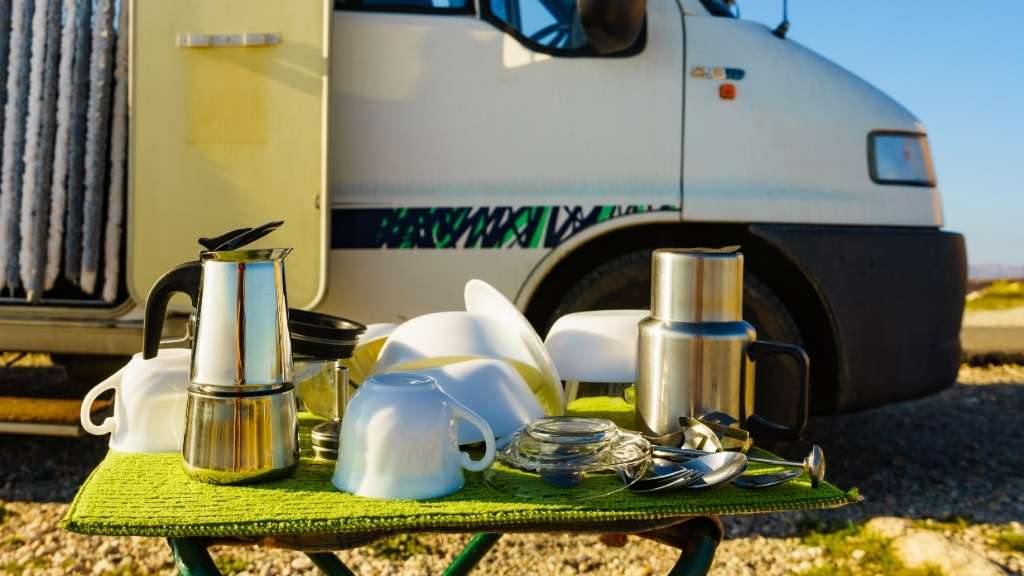
Each campervan hire company will provide you with an inventory list of equipment they provide. This will vary from company to company.
They will usually provide electric hook up cables, a full gas bottle and full, clean water tank.
Typically you will need to provide:
- Bedding.
- Kitchen equipment, plates, pots and pans, cutlery.
- Basic food items.
- Clothing.
- Towels.
Some hirers do offer some of these items for an extra fee.
Read more: What to Pack for a Campervan Trip (Complete Packing List)
Do you need to take an awning/tent?
For us as a family of four, it’s a yes every time. Kids come with plenty of clobber, including car seats which need to be stashed somewhere when you’re sleeping in the van.
If you are using the van as a touring vehicle during the day, it is handy to offload the equipment you don’t need during the day, so you have more space to eat lunch, get changed for the beach or play games.
It doesn’t need to be a “proper” awning that connects to the van; any extra tent space is handy. It can also double as an emergency location for your portable toilet so you don’t need to stumble to the amenities block in the night or if you have little kids who just can’t wait.
Having extra sleeping options is no bad thing as you never know what the great British weather will throw at you.
On a recent trip to Cornwall, we were faced with gale force winds over two days which meant we were worried about having the roof up. Following a rainy midnight effort to get the pop-top roof down safely, two of us needed somewhere else to sleep. Thank goodness for our extra tent space!
